Democracy on the Net: Onstage With Ai Weiwei and @Jack
It's March 2010 and the Paley Center hosts an event in NYC starring Chinese artist and activist Ai Weiwei, Twitter CEO Jack Dorsey, and your humble RWW editor. We're discussing the future of democracy.
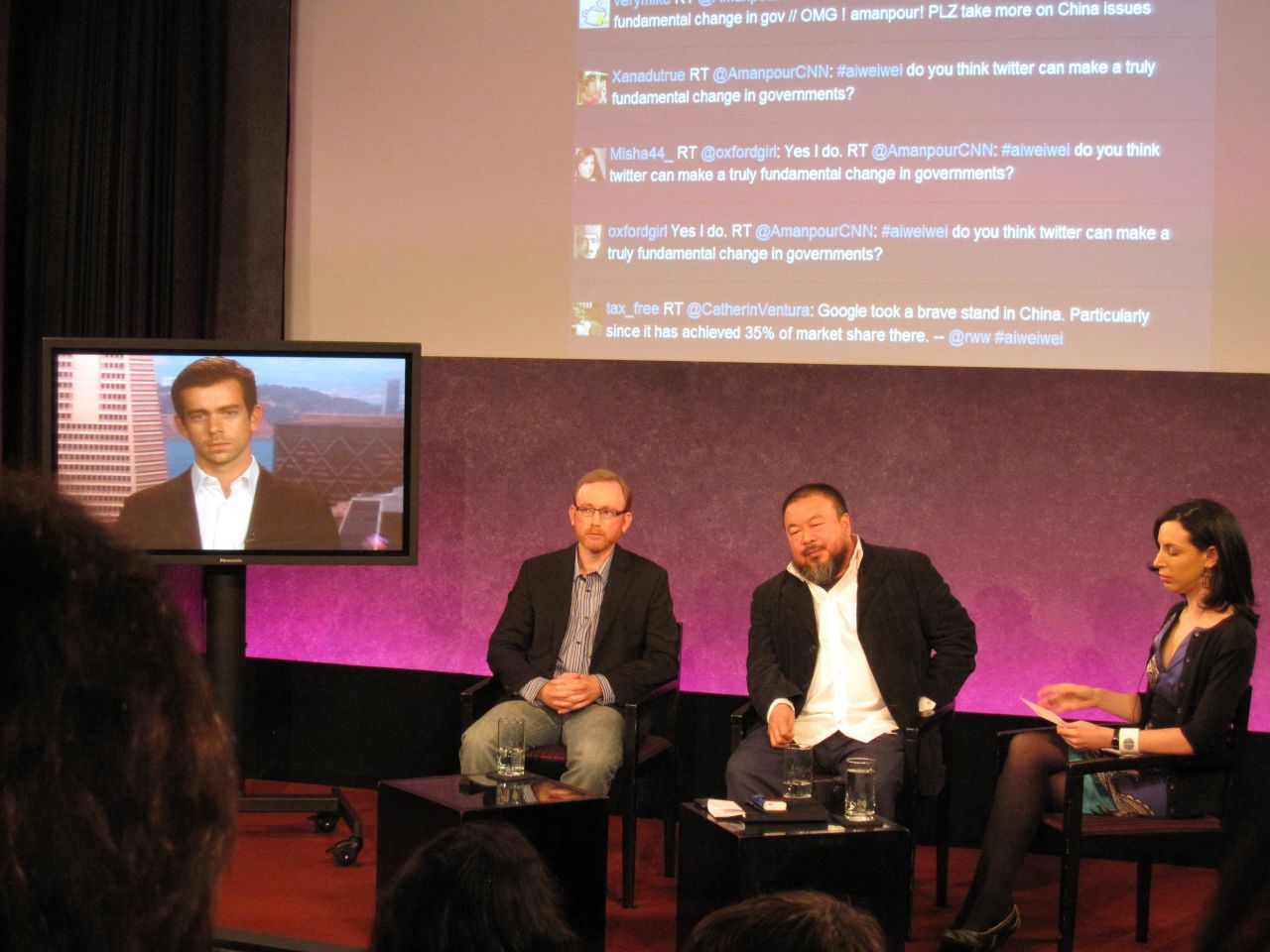
I didn’t know much about the Paley Center for Media before I entered its impressive white stone building on Fifty-Second Street. But I knew it was about as “old media” as it could get in New York City—and I mean that in a good way. Formerly the Museum of Television and Radio, it was a cultural institution, but also one that aspired to lead “today’s media conversation” (as the website tagline put it). The organization’s bread and butter were television and radio—two mediums that America helped define in the twentieth century—but it was also interested in what it termed “emerging platforms.” This is why a little-known tech blogger from New Zealand was invited onstage with Ai Weiwei and Jack Dorsey.
Elyssa and I arrived around 4:30 p.m. to meet with Lou Sagar, the agent who had booked me for this evening. He was a smartly dressed, well-tanned man who looked to be in his early sixties. With his thinning grey hair, active eyes, and a broad smile reminiscent of Jack Nicholson, he struck me as the kind of guy who knew a lot about New York culture. He also took an immediate liking to Elyssa, but I was too distracted by the thought of meeting Ai Weiwei to worry about it.
After an hour or two of meeting production people and discussing the evening’s format, I left Elyssa at the front of the building and was taken to the backstage area. I was shown the TV studio, which was well stocked with TV screens and broadcasting equipment.
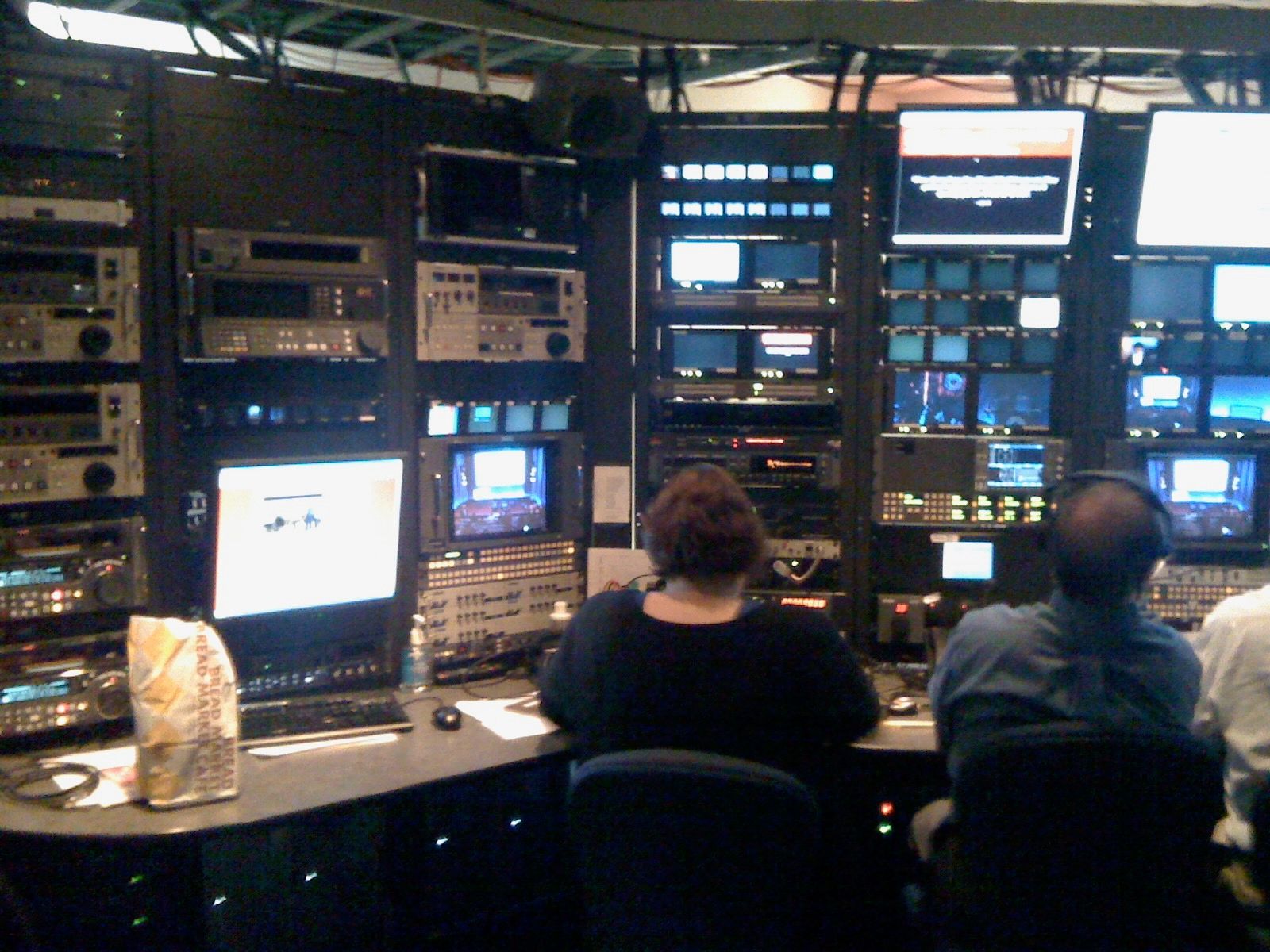
I was then guided into the green room, a small waiting area where I’d be until the show started. There Emily Parker, the MC for the evening, greeted me warmly. She was a tall, striking brunette woman in her mid-twenties. Like others I’d met that day at the Paley Center, she seemed steeped in New York old media—despite her youth, she’d already worked for the Wall Street Journal and the New York Times and was now a fellow at the Asia Society’s Center on US-China Relations. As we chatted, I also learned that she was working on her first book, about democracy on the internet.
As if to complement her almost perfect career progression, Emily was wearing a stylish purple-print dress for the evening. She was the picture of urban sophistication, and I felt shabby in comparison. I was wearing stonewashed blue jeans, a purple-and-lime-green-striped shirt, and a black blazer. But I quickly reminded myself that Steve Jobs always wore jeans, so I’d be fine. Also, the purple stripes on my shirt were kind of a match for what Emily was wearing, so I didn’t feel so bad after all.
After a short while, Lou brought in Ai Weiwei. He was fifty-two at this time and had close-cropped black hair and a well-groomed beard with flecks of grey in it. He wore a bright white shirt, dark linen pants, and a black blazer. He had a presence about him—like he knew he was famous, but he was comfortable enough in his own skin to not care about that. He also displayed no sign of nerves about going onstage.
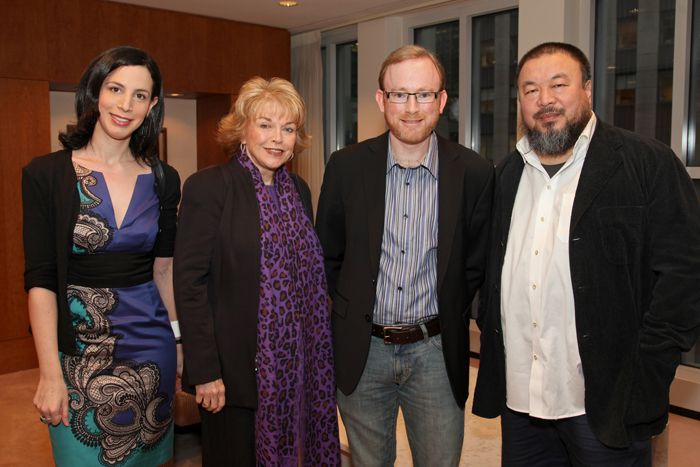
Lou introduced me to Weiwei (his first name), who shook my hand and gave me a friendly smile. He told me he was a fan of RWW and was very interested in what we wrote about. I was stunned he even knew what RWW was, so I think I just mumbled something like, “It’s an honor to meet you.”
Weiwei’s demeanor reminded me a bit of Tim Berners-Lee—there was a kindness and humility to him that I immediately respected. It even seemed like he was trying to put me at ease before we went onstage. However, unlike with Tim, I sensed a rebellious streak in Weiwei. There was a playful gleam in his eye, and it was also evident in the way he wore his shirt—the top button was conspicuously undone, leaving the collar splayed wide open, and the bottom hem was not tucked in. Perhaps I was reading too much into it, but from what I knew about him, Weiwei liked to do things his way.
I recalled a conversation I’d had a couple of years ago in Australia, when I’d met a Chinese entrepreneur at a tech event we were both speaking at. I’d asked him about Ai Weiwei (I knew about him even then), and the entrepreneur had chuckled knowingly. “Ai Weiwei’s untouchable,” he told me. “He can get away with things that other Chinese people can’t.” The implication was that Weiwei’s fame protected him from the Hu Jintao government; that they wouldn’t crack down on him for fear of causing an international uproar.
With Weiwei now here, we were ready for the night to begin. We were all led to the wings of the stage, where we watched Paley Center president and CEO Pat Mitchell give her introduction. Eventually, she introduced Weiwei. He calmly walked out and acknowledged the crowd’s enthusiastic applause with a bemused smile. If he was hated by his own government, then it was the complete opposite among this audience of liberal elites. I was introduced next, and the audience politely clapped as I nervously took my chair next to Weiwei. Very few among this East Coast crowd would’ve known who I was. Jack Dorsey’s clean-shaven digital avatar was already waiting in a monitor to my right, and Pat formally introduced him. Like Weiwei, he wore a white shirt and black blazer—although the top of his shirt was neatly buttoned up.
Pat then handed it over to Emily, who immediately made it clear that the discussion for the evening would be focused on Weiwei’s political activism and the grander theme of democracy on the internet. Emily told the audience that this was a major event in China: “I think Ai Weiwei has been sent here as a messenger for the Chinese netizens, so I know they will be watching avidly to see what comes out of this meeting.”
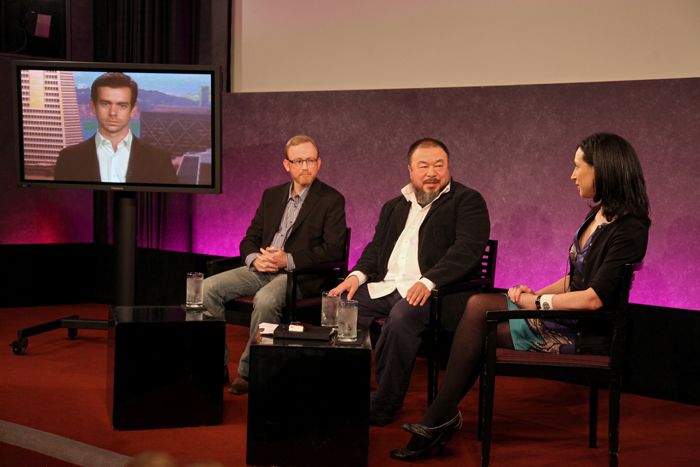
Surprisingly, she asked me the first question. She wanted me to give a general overview of the differences between internet culture in the US and China, adding, “If you have any questions, we can always turn it to Ai Weiwei.” I would certainly have questions about what the internet was like in China, but I started by giving my usual spiel about the emergence of the read/write web at around the time I started my blog. I noted the rise of social networks, including Twitter, and said, “In the Western world, it’s very much been about getting everybody to contribute to the web, to talk on the web and network on the web—and there’s been a real, you know, freedom of expression around that content.” (Of course, the West would get its comeuppance about “freedom of expression” in later years, in the form of misinformation and other hateful content, but at this time we all wore rose-tinted glasses.)
I knew only from secondhand reports what the internet was like in China, although in preparation for this event I had researched and written several posts about the topic—including one entitled “China’s Twitter Clones.” We also had ReadWriteWeb China, a Chinese-language version of our site hosted by Sohu (a Chinese web portal, similar to Yahoo) and run by Lei Zhang from the translation service Yeeyan. Zhang had started this in late 2006 by translating our articles—initially without my permission, but when he contacted me in early 2007, I was happy to hear about it and encouraged him to continue. In early 2009 it became an official RWW international channel.
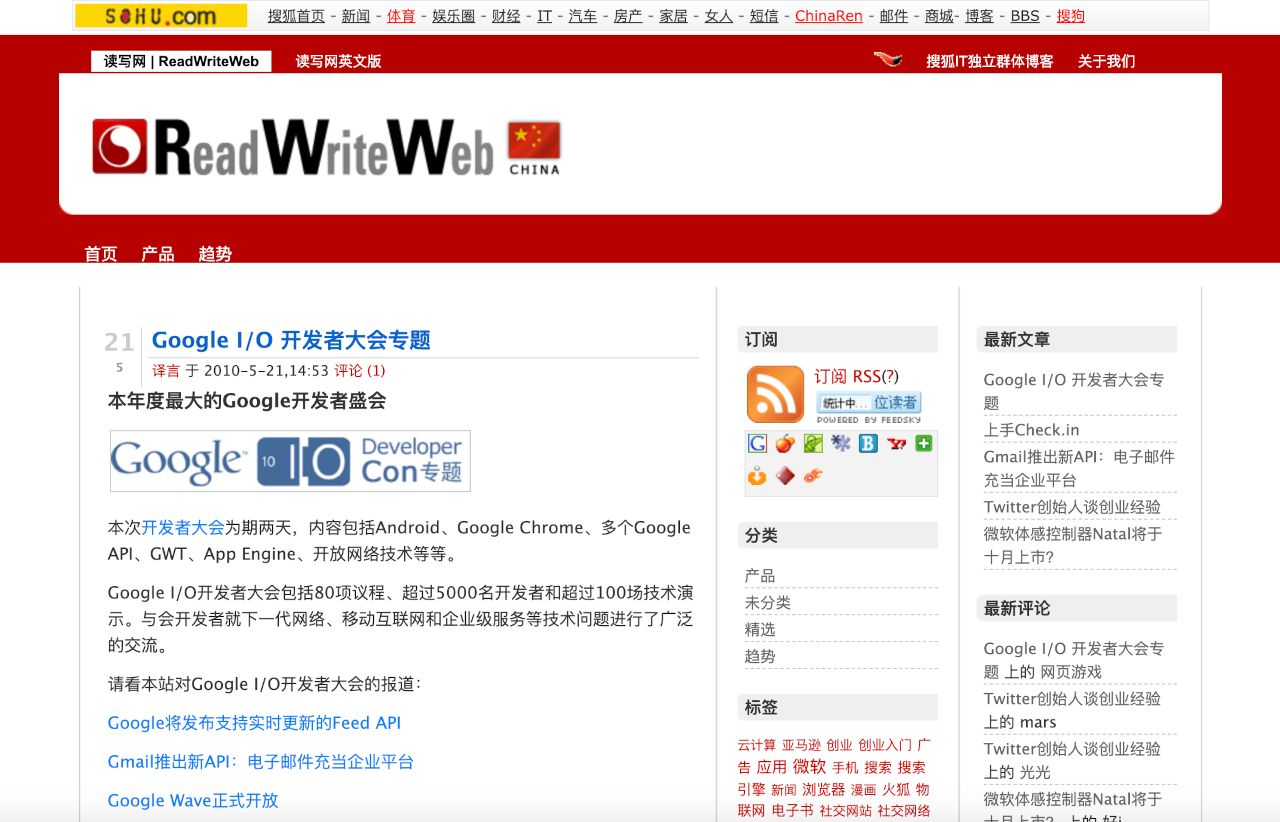
I told the Paley Center audience that since China had clones of all the Western social-web tools, the main difference I saw between internet culture in the West and in China was “only in the degree of freedom of expression.” The first Chinese Twitter clone, Fanfou, had been shut down by the Chinese government in 2009; since then others, notably Sina Weibo, had emerged to take its place. Given that Jack was on the panel, I specifically mentioned that Twitter was also currently banned in China, but that there were “a number of Twitter clones in China that are being used by a great number of Chinese people.” I then passed the discussion over to Ai Weiwei to tell the audience about his experience.
Weiwei noted that they could not use Twitter, YouTube, or Facebook in China, and that Google might soon be added to that list. (It was an active debate at the time—I’d gone to a SXSW panel a few days before that had discussed Google’s prospects in China.) “Basically, it’s a society which forbids any flow of information and of freedom of speech,” Weiwei remarked. He explained that even though the Chinese internet had lots of clones of Western apps, their usage was closely monitored and censored by the government—users weren’t allowed to mention his name, for example.
He went on to say that he’d started out in 2005 by blogging to promote his work as an artist, but that had been shut down by the Chinese government in 2009, after his blog had gotten popular. So he began using Twitter and quickly got hooked on it. He added, however, that only a small proportion of Chinese netizens had access to his Twitter because of the great firewall.
Emily then brought Jack into the discussion, and he told the story of how he created Twitter. Things got more interesting when Weiwei asked Jack why they hadn’t provided a Chinese-language version of Twitter. Jack’s response was that technical constraints had prevented that so far (Twitter was known to have outages in its early years—many early users will remember seeing the “fail whale” on a regular basis). Another reason for the delay, he added, was technical difficulties in supporting the character sets in Chinese languages.
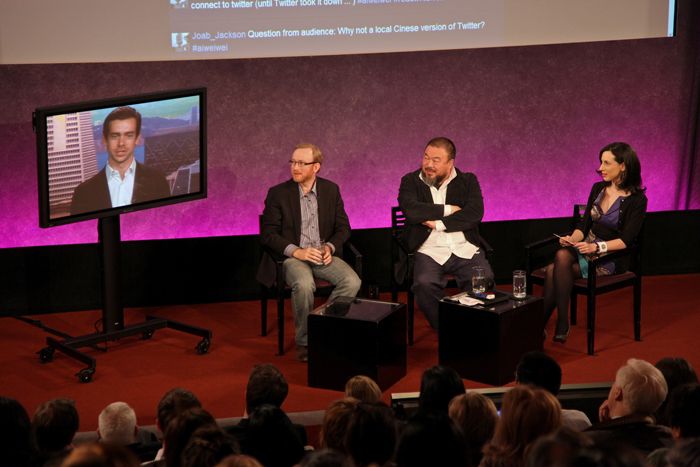
I tried to do my journalist bit and press Jack on whether Twitter would officially enter the China market, and if so, would it stand up to the government and resist censorship, as Google had recently started to do? It turned out that Jack hadn’t even realized Twitter was banned in China until a few weeks before, and he clearly wasn’t interested in trying to compete in the Chinese market. So my questions were unfortunately moot. The rest of the evening passed by in a similar manner—there were no real-world implications for anything that was said, so it was all rather academic. However, Weiwei did get feisty during the audience Q&A, when a woman who identified herself as a Chinese American businesswoman suggested that China’s growing middle class was happy.
“I don’t think you should give credit to a nation that deprives people of human rights,” Weiwei snapped back. “You say they’re happy? I’m sure, because they made money so easily.”
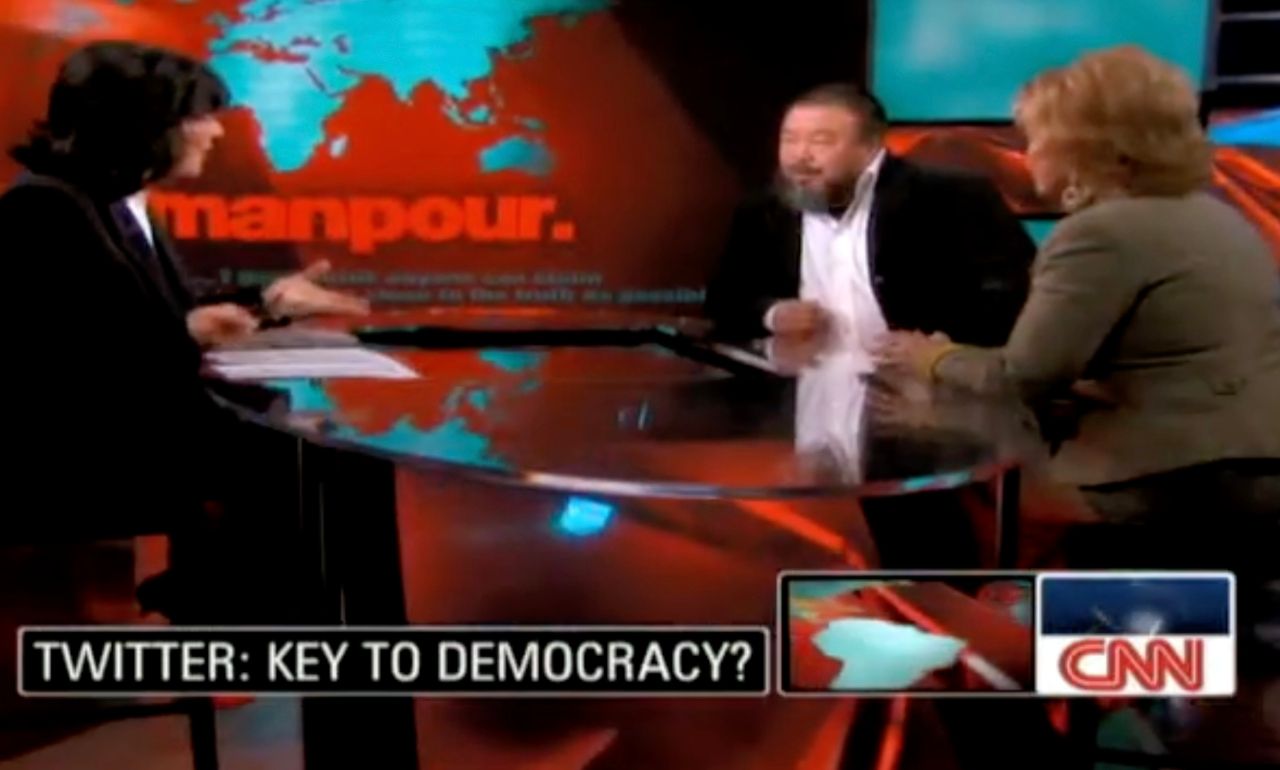
In the years to come, I followed Weiwei’s life and career closely—although I had little direct contact with him, other than the odd message via Twitter DM. Less than a year after we shared a stage in New York, Weiwei was arrested by the Chinese government. That was in early 2011, and he wasn’t allowed to travel overseas again until mid-2015. I read later in his memoir that he had been detained for nearly three months in an anonymous building in Beijing. So, he hadn’t been untouchable after all.
To his great credit, Ai Weiwei has never once wavered on his democratic beliefs and continues to use Twitter/X for digital activism to this day. Also, as Jack promised, Twitter did eventually come to support the Chinese language. The service is still officially banned in China, but so is every other major Western internet product (including Google).
So was this an “historic conversation” about the future of democracy on the internet, as the Paley Center—and RWW itself—promoted back in 2010? In the end, no “positive social change” came out of it, so in that sense history will view it as little more than a good night out for some liberal New Yorkers. But on the other hand, I did get to meet Ai Weiwei, who I’m certain will be remembered as one of the great artists of the early twenty-first century. Turns out, he was a fan of the read/write web too.
Image credits: Feature image by Esther Dyson via Flickr. The other photos of the event were in my archives, but I'm afraid I don't recall who sent them to me.
This post is part of my serialized book, Bubble Blog: From Outsider to Insider in Silicon Valley's Web 2.0 Revolution. View table of contents.
Next up: 047. SXSW Music Blues and RWW Community Manager Departs
Buy the Book
My Web 2.0 memoir, Bubble Blog: From Outsider to Insider in Silicon Valley's Web 2.0 Revolution, is now available to purchase:
- Paperback, US$19.99: Amazon; Bookshop.org
- eBook, US$9.99: Amazon Kindle Store; Apple Books; Google Play
Or search for "Bubble Blog MacManus" on your local online bookstore.